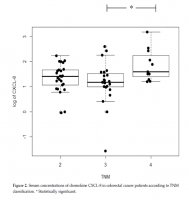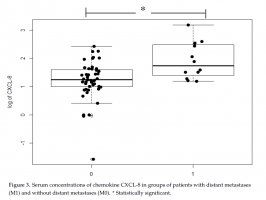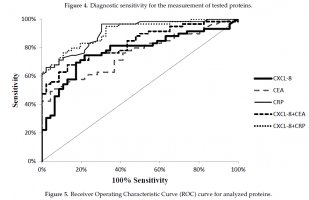Our research team from the Department of Biochemical Diagnostics and the Department of Neurodegeneration Diagnostics of the Medical University of Bialystok has published an article entitled:
"The Clinical Utility of Serum CXCR-2 Assessment in Colorectal Cancer (CRC) Patients" in the international journal Anticancer Research.
Colorectal cancer is one of the main causes of deaths due to malignant neoplasms of the gastrointestinal tract, both in Poland and in the world. According to the latest epidemiological data, almost 2 million people develop CRC every year, and about 50% of patients die from this malignancy. Despite the fact, that screening programs allowed to reduce the incidence of CRC in the population over 50 years of age, the high value of this indicator is still observed in people aged 20-49.
Therefore, biochemical markers are being searched to improved earlier detection of colorectal cancer patients, and furthermore faster implementation of effective treatment. According to our knowledge, presented results as a first revealed higher diagnostic sensitivity of the combined measurements of the serum chemokine receptor CXCR2 concentration and the classic tumor marker – CEA (carcinoembryonic antigen) or the inflammatory marker - CRP (C-reactive protein) than determination of a single marker for CRC, which may improve early diagnosis of patients with this malignancy.
The present paper is a continuation of our previous investigations, in which we evaluate the diagnostic significance of selected specific proteins in gastrointestinal malignancies (Figure 1). A research study published last year showed a statistically significant difference between the concentrations of the CXCL8 chemokine - the ligand for the CXCR2 receptor and the tumor stage as well as the presence of distant metastases, which suggests the role of this protein in the progression of colorectal cancer (Figure 2). In addition, the determination of CXCL8 concentrations was characterized by greater diagnostic utility compared to the classic tumor marker (Figure 3), suggesting the importance of this chemokine in the diagnostic process of colorectal cancer patients. In the future, our research team is going to conduct further studies on the role of selected specific proteins in the pathogenesis of gastrointestinal cancers and their usefulness as potential tumor markers.
https://ar.iiarjournals.org/content/41/3/1421.long



_m.jpg)



